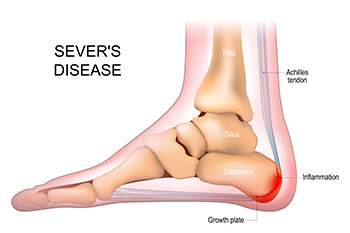283 St Rose Ave
Windsor, ON N8S 1X1
Causes and Impact of Sever’s Disease
Tuesday, 11 June 2024 00:00
Sever's disease affects children and adolescents, particularly those engaged in physical activities like sports. It is not a disease but rather a disorder caused by inflammation of the growth plate in the heel bone, known as the calcaneal apophysis. This inflammation results from repetitive stress or tension on the heel bone, often during periods of rapid growth and development. Sever's disease typically affects children between the ages of eight and 14, when the growth plate is still open and vulnerable to injury. Activities that involve running, jumping, or high-impact movements can lead to heel pain, swelling, and tenderness, especially during or after physical activity. Sever's disease is not usually serious and typically resolves with rest and conservative treatments like stretching and heel cushions. However, it can temporarily limit a child's participation in sports and other activities, emphasizing the importance of proper management and injury prevention strategies. If your active child is complaining of heel pain, it is suggested that you schedule an appointment with a podiatrist who can properly diagnose and treat Sever’s disease.
Sever's disease often occurs in children and teens. If your child is experiencing foot or ankle pain, see the practitioners from Foot Care Institute. Our practitioners can treat your child’s foot and ankle needs.
Sever’s Disease
Sever’s disease is also known as calcaneal apophysitis, which is a medical condition that causes heel pain I none or both feet. The disease is known to affect children between the ages of 8 and 14.
Sever’s disease occurs when part of the child’s heel known as the growth plate (calcaneal epiphysis) is attached to the Achilles tendon. This area can suffer injury when the muscles and tendons of the growing foot do not keep pace with bone growth. Therefore, the constant pain which one experiences at the back of the heel will make the child unable to put any weight on the heel. The child is then forced to walk on their toes.
Symptoms
Acute pain – Pain associated with Sever’s disease is usually felt in the heel when the child engages in physical activity such as walking, jumping and or running.
Highly active – Children who are very active are among the most susceptible in experiencing Sever’s disease, because of the stress and tension placed on their feet.
If you have any questions, please feel free to contact our office located in Windsor, ON . We offer the newest diagnostic and treatment technologies for all your foot and ankle injuries.








